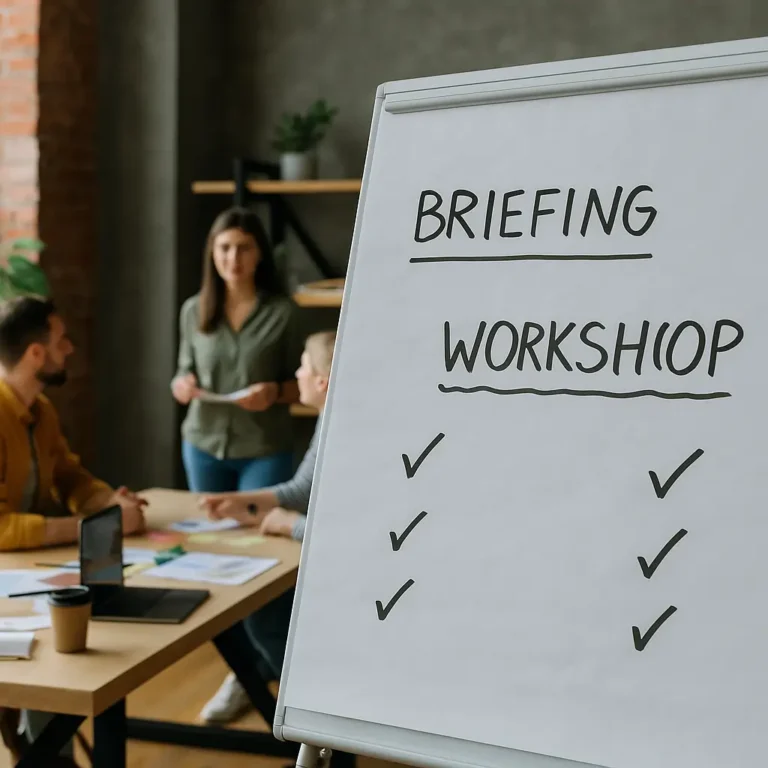
Why does the project kickoff matter so much?
Every successful software project starts with alignment. Whether you’re building an app, redesigning a website, or automating internal processes, getting everyone on the same page is essential. But how you get there can look different depending on the project and your company’s needs.
At Pegotec, we work with a diverse range of clients, including international NGOs and fast-growing SMEs. Some projects kick off with full-day strategy workshops. Others begin with a clear and focused briefing document. And both approaches can be practical—when used at the right time.
When does a workshop make sense?
Workshops are where ideas come alive. There’s real value in sitting together, sketching on a whiteboard, debating goals, listing what won’t work, and shaping a shared understanding of what needs to happen. It’s not just about the project. It’s about the people involved.
We love running workshops because they:
- Create clarity early on
- Build trust between teams
- Uncover needs that might not surface in written documents
- Define a shared language and mindset
For complex or strategic projects, workshops help us go beyond the surface. They show whether our way of working fits yours. They reveal blockers and possibilities. And they often align teams faster than weeks of email exchanges.
If you’re launching something ambitious or exploratory, a workshop is not a luxury—it’s a necessity.
When is a briefing the better choice?
Not every project needs a big kickoff session. Sometimes, speed matters more. If you already know what you want, a concise, well-structured briefing can be the best way to get started.
Briefings are especially useful when:
- The scope is clear and defined
- The timeline is tight
- The goal is to move fast with minimal overhead
- You’ve already worked with your software partner before
A good briefing outlines the essentials: the goal, the audience, the timeline, the must-haves, and any technical constraints. That’s it. No need for slides or sticky notes—just facts, focus, and a clear direction.
We respect that approach. At Pegotec, we’re not here to make every project bigger than it needs to be. We’re here to make it work.
Why does Pegotec use both?
For us, it’s not about choosing sides. It’s about staying flexible.
We adapt our process to your project—not the other way around. If a workshop will add value, we propose one. If a briefing is enough, we roll with it. What matters is that the foundation is strong, the expectations are aligned, and the path ahead is clear.
We’ve seen success from both approaches. A workshop can bring energy and insight. A briefing can save time and cut through noise. It all depends on the complexity, the team setup, and the goals.
That’s why we often ask one key question at the start: What do you need to feel confident moving forward?
Whether you need a structured session with multiple stakeholders or a lean document to review over coffee, we’ll shape our process around your reality.
So—Workshop or Briefing?
There’s no one-size-fits-all answer. And that’s the point.
Modern software development needs flexibility not just in the code, but in the collaboration. We believe in choosing the right tool for the right phase. Sometimes that’s a day-long workshop. Sometimes it’s a two-page brief. Often, it’s a mix of both.
The real win is when everyone knows where the project is going—and feels invested in the outcome.
Contact us today to discuss a Workshop or a Briefing—the Smart Way to Start Your Software Project.
Frequently Asked Questions (FAQ)
A workshop is a live, collaborative session aimed at exploring ideas, aligning teams, and digging into challenges. A briefing is a written document that outlines key project information clearly and concisely.
No. We choose the format based on the project’s scope and the client’s needs. Some projects begin with a structured workshop, while others start with a briefing.
Our standard discovery workshop runs from 2 to 4 hours. For complex systems, we might split the session over multiple days to ensure all areas are covered without rushing.
Absolutely. If new questions arise or if the project grows in complexity, we may recommend a workshop as the next step. Our approach stays adaptive throughout the project.
The most important parts of a briefing are: project goals, timeline, technical constraints, key stakeholders, target users, and known challenges. We provide a briefing template if needed.
Need help with your project?
Book a free 30-minute consultation with our developers. No strings attached.